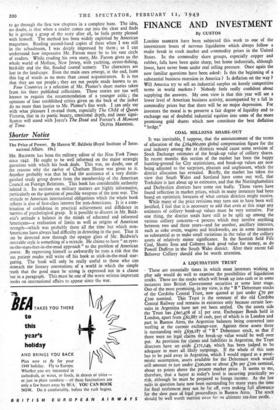Shorter Notice MR. BALDWIN has been the military editor of
the New York Times since 1942. He ought to be well informed on the major strategic questions with which his book deals. This was, no doubt, one of the reasons why the cachet of Chatham House was given to it. Another probably was that he had the assistance of a very distin- guished study group drawn from the membership of the American Council on Foreign Relations. This book has considerable authority behind it. Its sections on military matters are highly informative, particularly on the question of possible weapons of the next war. The ntitude to American international obligations which the whole book reflects is also of first-class interest for non-Americans. It is a com- bination of confidence in practical achievement and diffidence in matters of psychological grasp. It is possible to discern in Mr. Bald- win's attitude a balance in the minds of educated and informed Americans—a realisation of limits as well as origins of American 3trength—which was probably there all the time but which non- Americans have always had difficulty in detecting in the past. That it an be detected now through the opaque glass of Mr. Baldwin's execrable style is something of a miracle. He claims to have "an eyes- 3n-the-stars-feet-in-the-mud approach" to the problem of American power. By expressing himself so awkwardly he runs a risk that the less patient reader will write off his book as stick-in-the-mud star- gazing. The book will only be really useful to those who can stomach the literary conventions of a world in which the simple truth that the good must be strong is expressed not in a clause but in a paragraph. This .must be one of the worst written important books on international affairs to appear since the war.






































 Previous page
Previous page